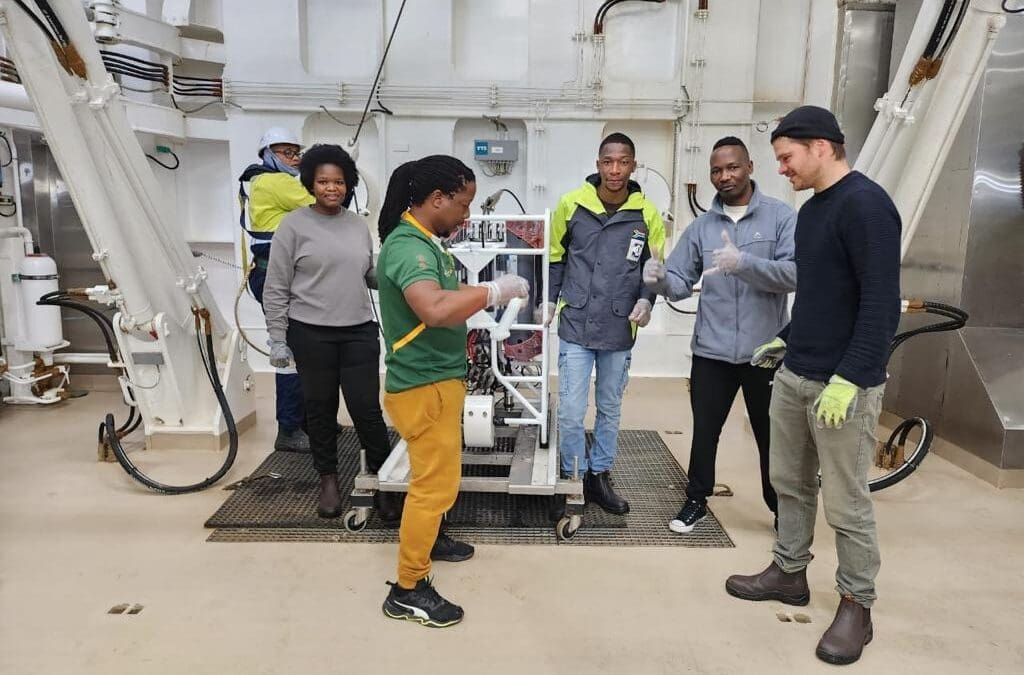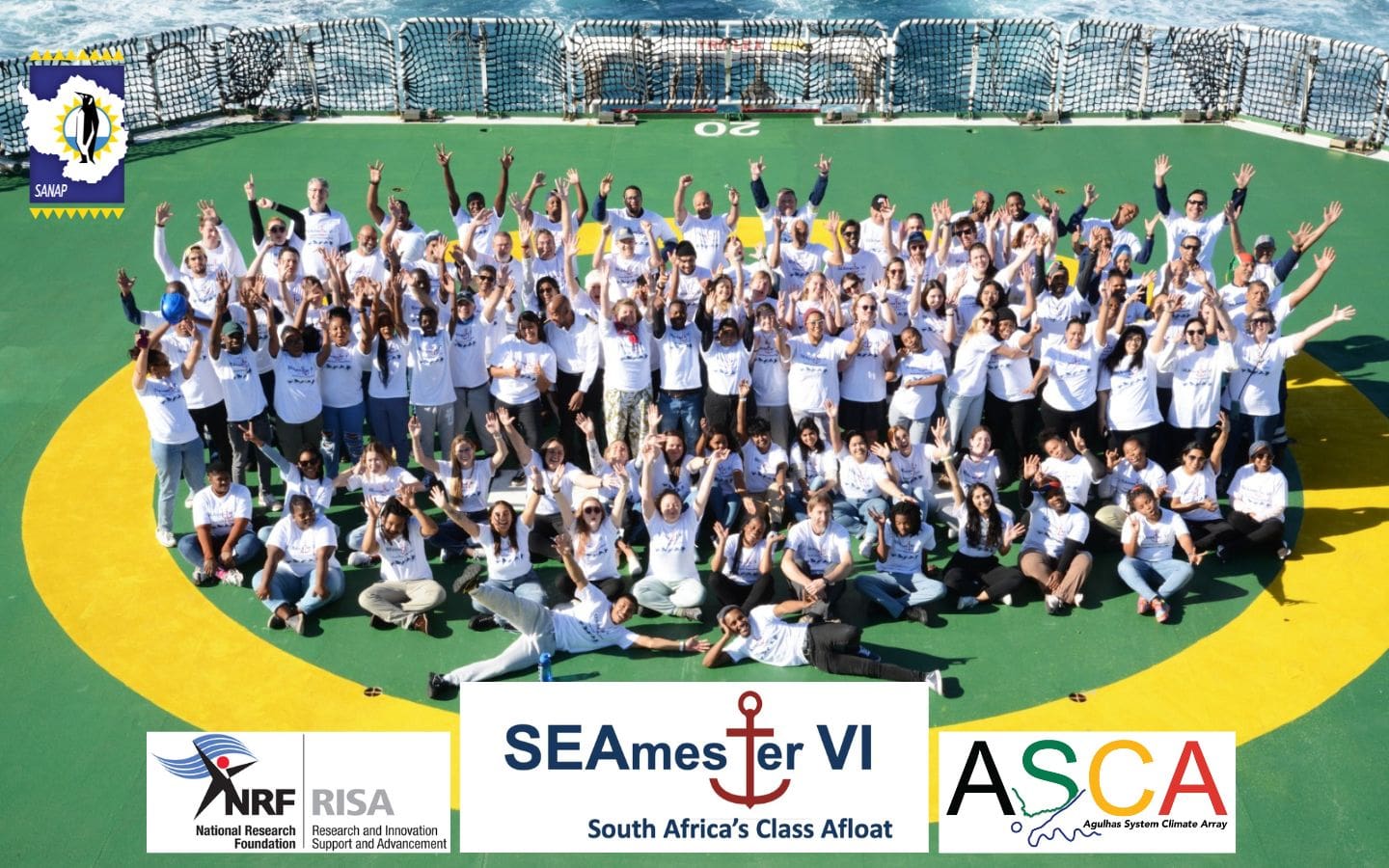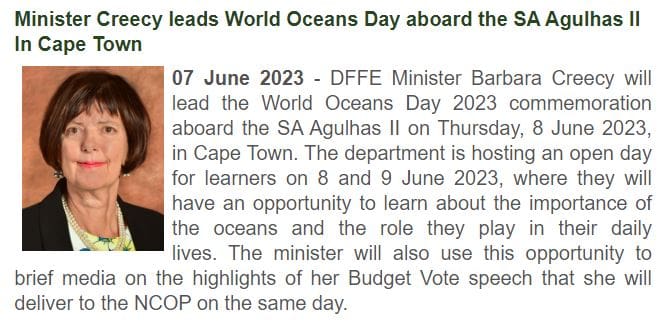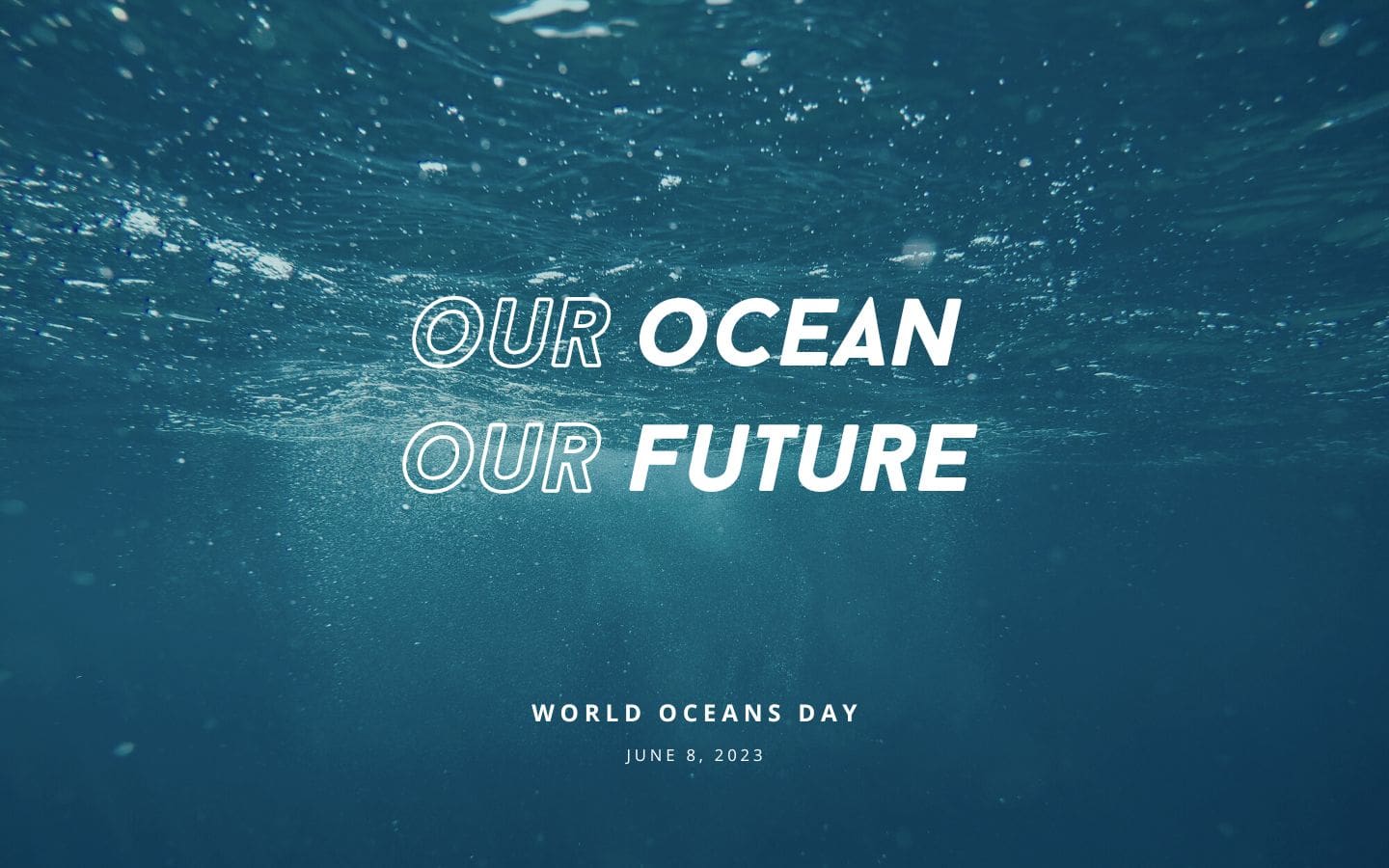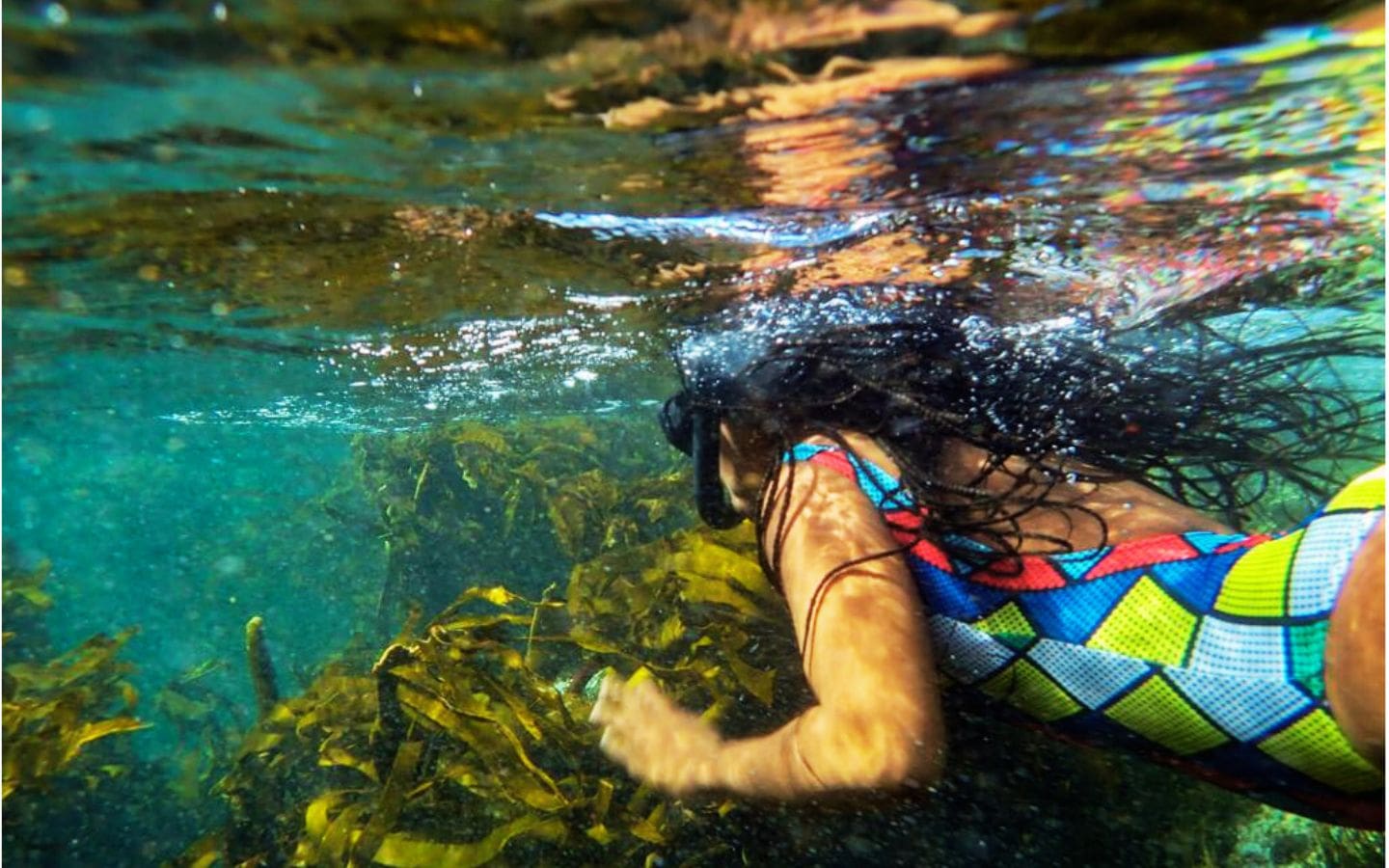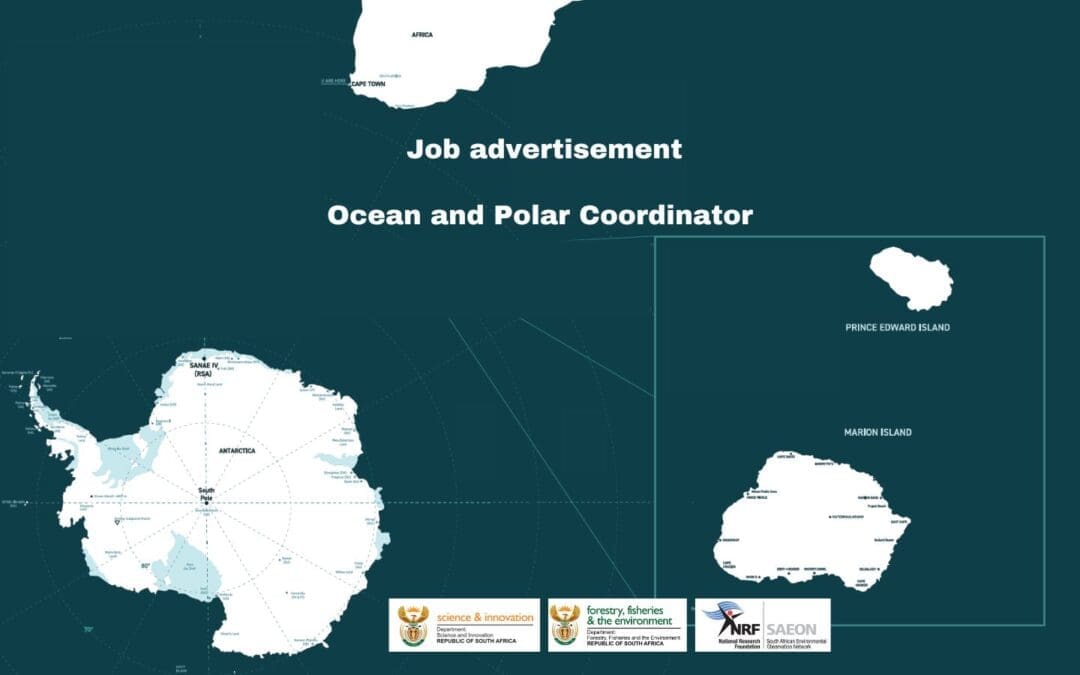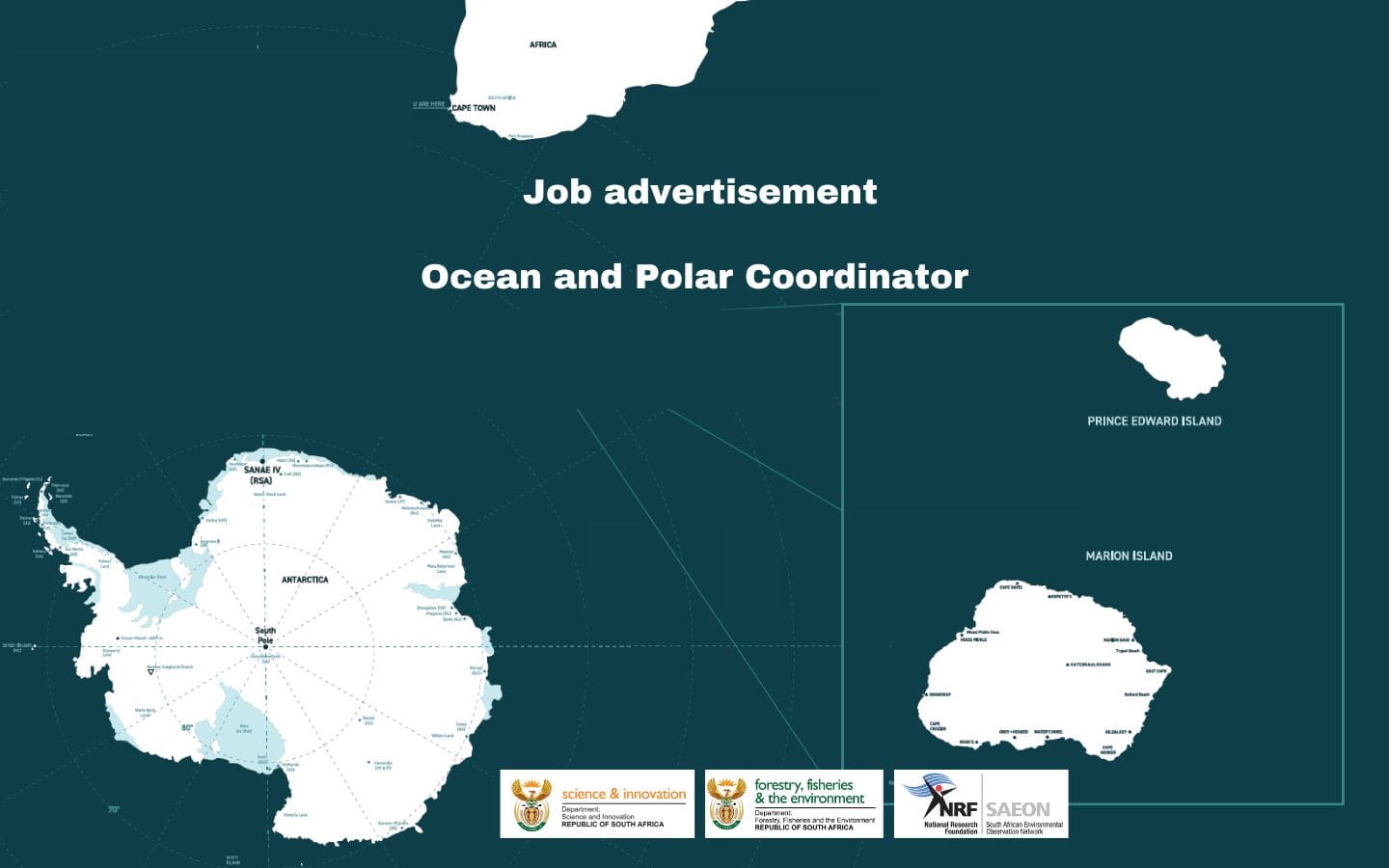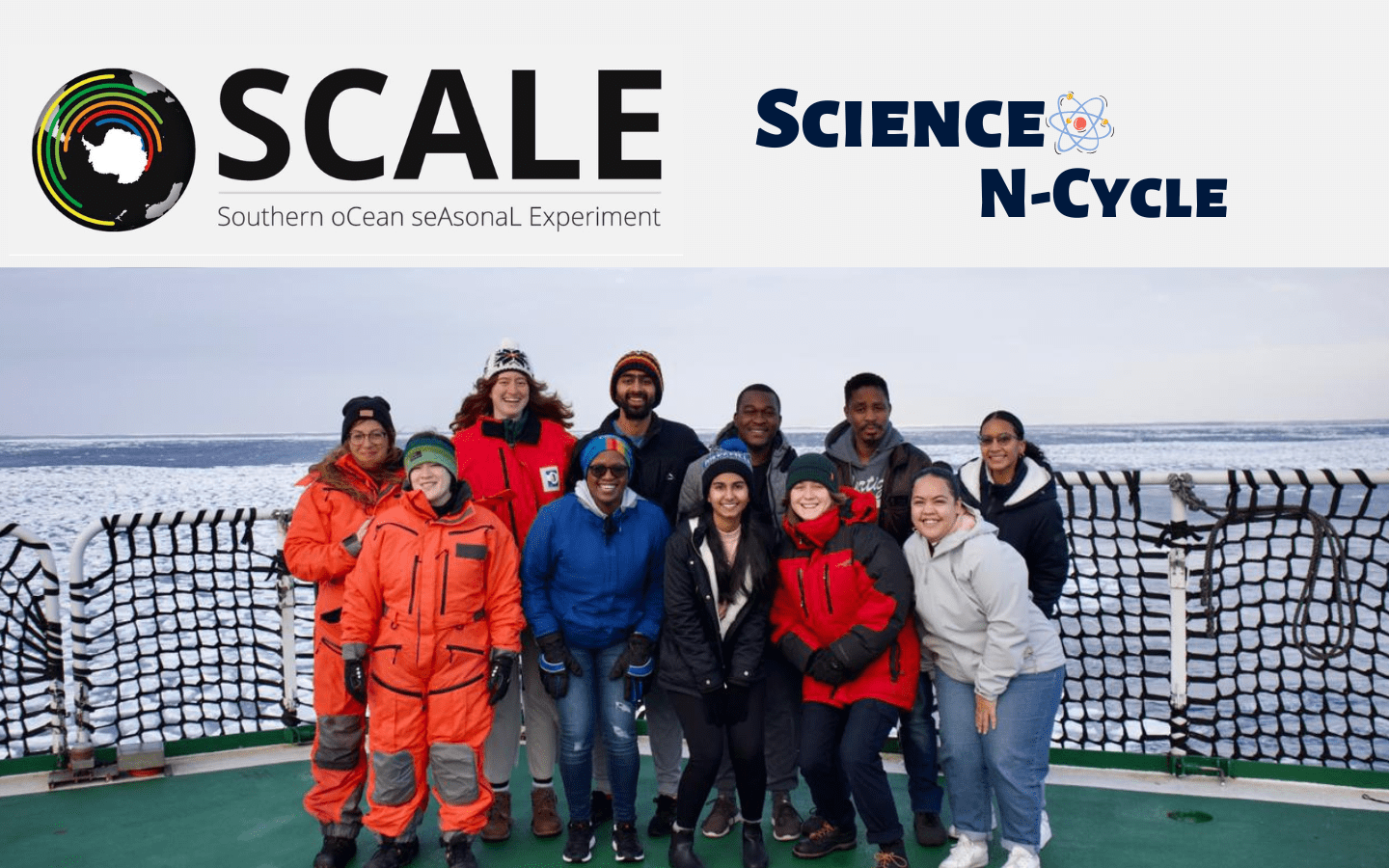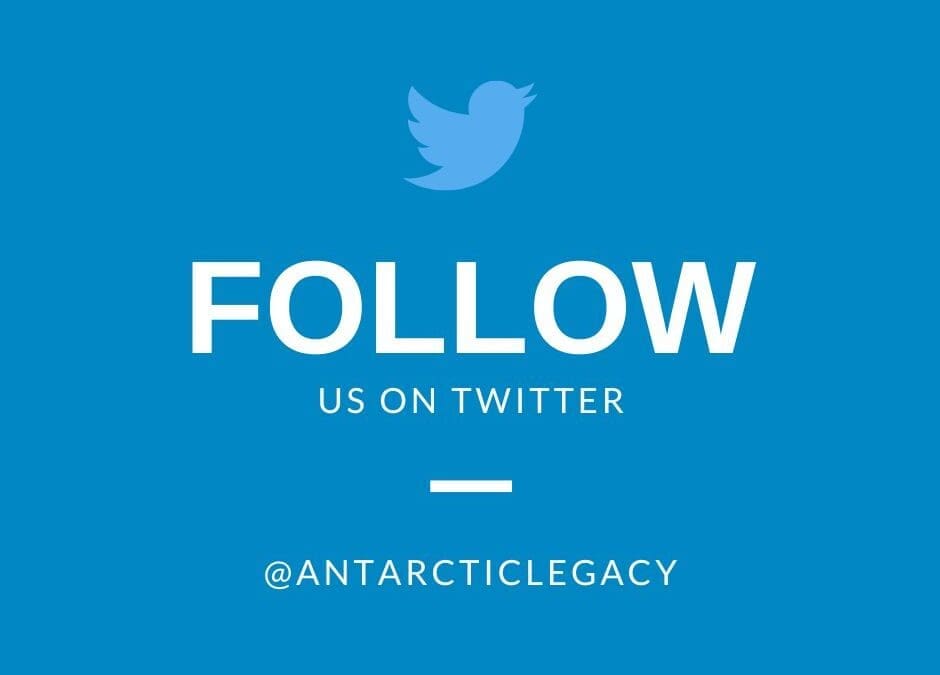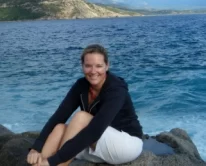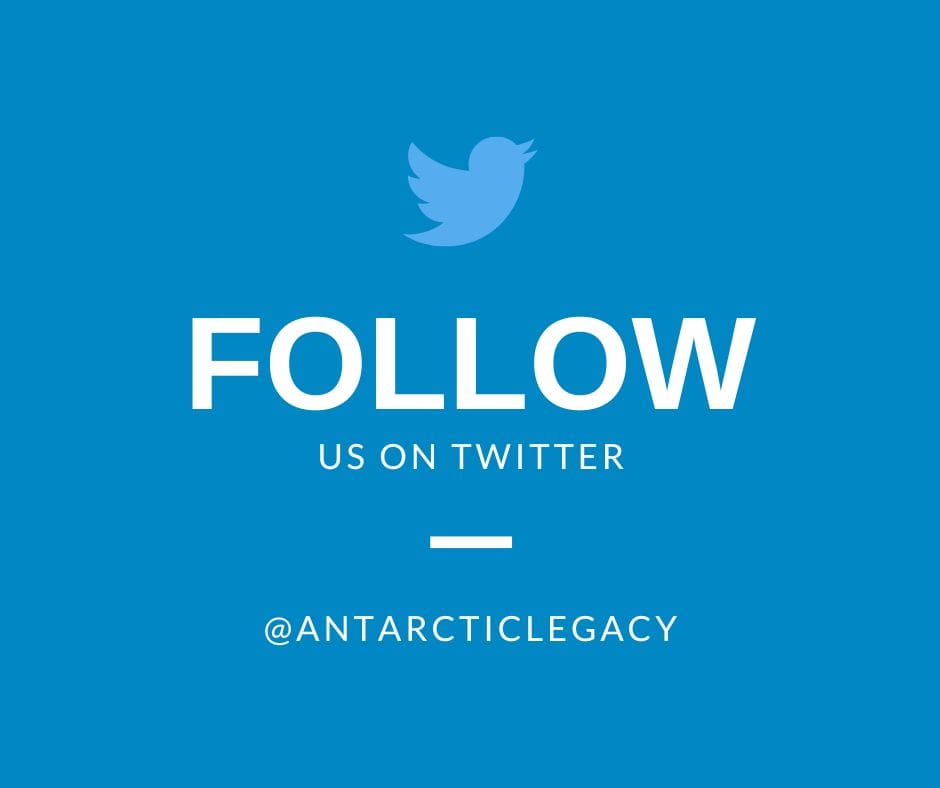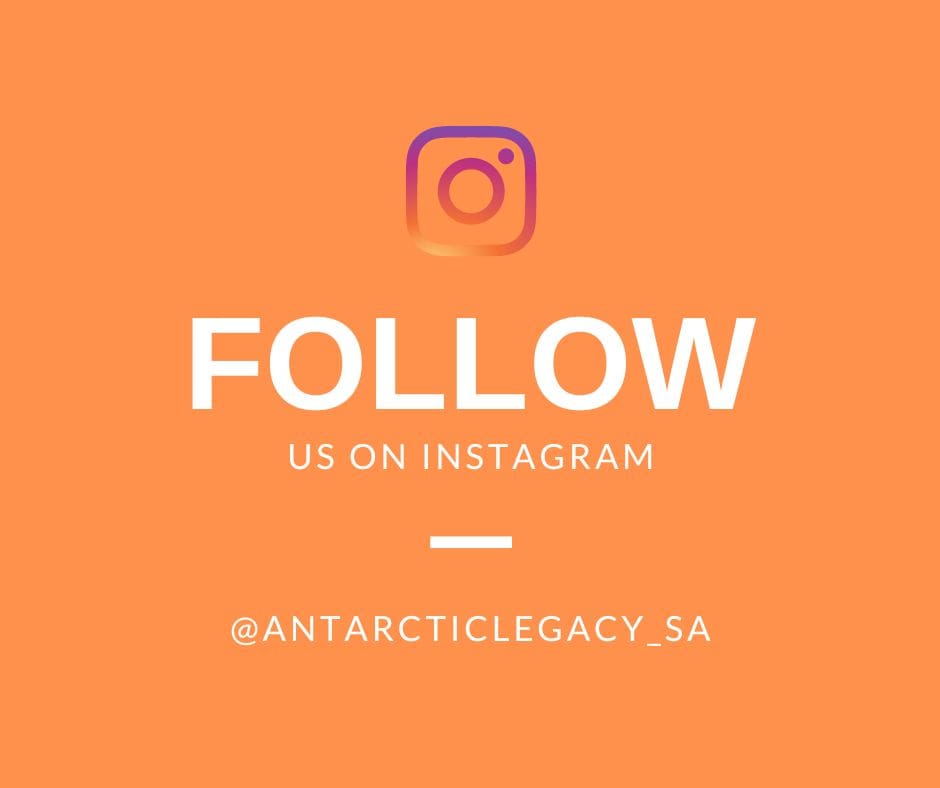
by Ria Olivier | Oct 30, 2023 | Environment, geochemistry, Gough Island, News, Oceanography, Research, SA Agulhas II, SA Polar Research Infrastructure, SANAP, SAPolarRI, SAPRI, Science, South Atlantic, Southern Ocean, sub-Antarctic, Tristan da Cunha
Research team on the recent Gough Island takeover expedition.
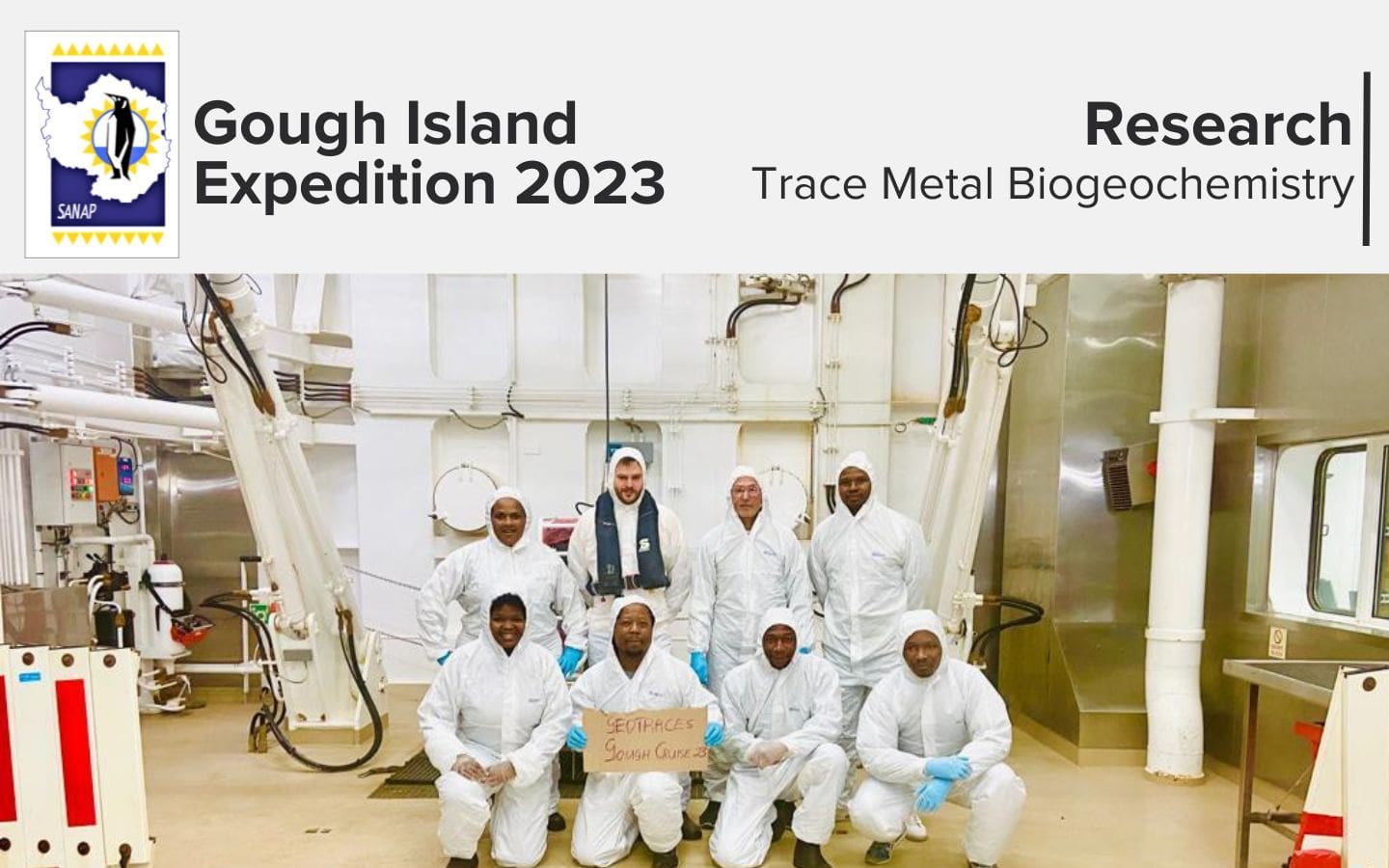
Phytoplankton are microscopic plants that live in the ocean, and just like plants on land they need to have enough food to grow and be happy. However, some places in the ocean don’t have enough food for them whereas some places do. The Southern Ocean Carbon & Climate Observatory (SOCCO) team based at CSIR, Trace Metals team based at Stellenbosch University (TracEx) and the Department of Forestry, Fisheries and the Environment: Oceans and Coasts team are trying to figure out where those places are (in the Southern Ocean).
During the Gough Island takeover expedition:
The Trace Metal Biogeochemistry research teams sampled upstream and downstream of Gough Island to look at how the Antarctic Circumpolar Current (ACC) interacts with the island to resuspend sediments from the seafloor. This resuspended sediments acts as a source of trace metals to the surface mixed layer in support of phytoplankton blooms. The team used a 12 bottle mini-CTD rosette system (see image below, right) to sample for dissolved trace metals, particulate trace metals and organic trace metal chemistry.
| TEAM | Trace Metal Biogeochemistry |
| Projects Name | Seasonal Iron speciation in the Southern Ocean, from open ocean environments to naturally fertilized sub-Antarctic Islands (Marion and Gough Island) |
| Principal Investigator | Dr Thomas Ryan-Keogh | Senior Researcher at the Southern Ocean Carbon-Climate Observatory (SOCCO), CSIR South Africa |
| Co-Principal Investigator (On board DFFE team leader) | Dr TN Mtshali | Department of Forestry, Fisheries and the Environment (DFFE) |
| Co-Principal Investigator | Prof AN Roychoudhury | Stellenbosch University (TracEx) |
| SOCCO/TracEx on board team leader | Olie Valk | TracEx |
On board team member (PhD Student)
| Thapelo Ramalepe | SOCCO-TracEx |
On board team member (MSc Student)
| Miranda Sitofile | SOCCO-TracEx |
| On board DFFE team member | Mutshutshu Tsanwani | DFFE |
| On board DFFE team member | Kanyisile Vena | DFFE |
| On board DFFE team member | Hassan Ismael | DFFE |
| On board DFFE team member | Mbulelo Makhetha | DFFE |
| On board team members | Including all ship-based scientists sampling for trace metals |
The project in more detail:
The Southern Ocean (SO) is one of the largest high-nutrient low-chlorophyll regions in the World’s Ocean, where primary productivity is limited by iron bioavailability, thereby impacting the strength and efficiency of biological carbon pump. There are, however, exceptions with large phytoplankton blooms persistently observed downstream of the sub-Antarctic Islands. While extensive research has focussed on iron-biogeochemistry around Kerguelen and Crozet islands, no such studies have been conducted at Marion and Gough islands.
Furthermore, whilst our previous studies have made substantial advances toward addressing the gaps in seasonal data coverage through the Southern oCean seAsonaL Experiment (SCALE) 2019 winter and spring expeditions, there is still a paucity of dissolved iron data in the SO, especially from autumn to late spring. This is severely hampering our understanding of the full seasonal biogeochemical iron cycle and its impact on primary production. This project aims to continue its focus on seasonality by expanding seasonal coverage of iron measurements to include autumn (Marion) and late-spring (Gough) expeditions for more comprehensive coverage of the SO seasonal cycle, with a particular focus on quantifying biogeochemical cycling of iron-pool around these understudied islands.
This project is funded by: The National Research Foundation, South African National Antarctic Programme funding (NRF-SANAP).
Current NRF-SANAP funded projects
Visit SOCCO here! Visit TracEx here!
Featured Image: L-R (Back): Kanyisile Vena (DFFE), Ole Valk (TracEx), Hassan Ismael (DFFE), Mbulelo Makhetha (DFFE); (front) Miranda Sitofile (SOCCO-TracEx), Thato Mtshali (DFFE), Thapelo Ramalepe (SOCCO- TracEx), Mutshutshu Tsanwani (DFFE).
Project information supplied by Dr Thomas Ryan-Keogh. Images supplied by Thapelo Ramalepe.
Anche Louw, South African Polar Research Infrastructure, 30 October 2023.

by Rabia Mathakutha | Jul 26, 2023 | Environment, Oceanography, Research, SA Agulhas II, SA Polar Infratsructure, SA Polar Research Infrastructure, SANAP, SAPolarRI, SAPRI, Science, SEAmester

SEAmester – South Africa’s Class Afloat in association with the Agulhas System Climate Array (ASCA).
June 2023 saw the success of the 6th SEAmester expedition, a programme aimed at accelerating marine science as an applied and cross-disciplinary field to postgraduate students all over South Africa. Forty-seven science students from institutions across the country made it through the programme and participated in the SEAmester ten-day at-sea practical training course aboard the flagship South African research vessel, S.A. Agulhas II. The programme was led by Prof. Isabelle Ansorge, head of the Department for Oceanography at the University of Cape Town (UCT) and initiator of the programme; and coordinated by Tahlia Henry.
SEAmester is a programme initiated to meet the Department of Science and Innovation (DSI) objectives of creating platforms to “attract young researchers to the region and retain them by exciting their interest in aspects of global change”. SEAmester introduces marine science as an applied and cross-disciplinary field to students. The strength of SEAmester is that postgraduate students combine theoretical classroom learning with the application of this knowledge through ship-based and hands-on research.
SEAmester was undertaken in collaboration with ASCA, a science project spearheaded by DSI and the South African Environmental Observation Network (SAEON), Egagasini Node. ASCA is a multi-institutional, international collaboration, whose objectives are to determine how the Agulhas Current and its role in the global conveyor belt varies over time by providing the first long-term observations of Agulhas Current volume, heat and salt transport and its variability through seasonal to interannual timescales. To read more about ASCA click here.
Since ASCA provides a large, international programme performing ground-breaking science, and is also being used as a training platform for students, interns and junior staff, teaming SEAmester with ASCA makes an excellent match, one that has worked successfully for all SEAmester expeditions to date.
Students taking photos and soaking in the views as they bid farewell to Cape Town en route to the expedition.
Setting sail
The S.A .Agulhas II voyaged from East Pier, Cape Town on 20 June 2023 to the Agulhas Current, off East London, and docked back in Cape Town on 29 June 2023. The expedition involves running a transect across the core of the Agulhas Current off Port St Johns. The SEAmester VI expedition encompassed a group of forty-three postgraduate students from various Higher Education Institutions (HEIs) across the country (both inland and along the coast), including, two high school learners from the Northwest School, and two junior scientists from Anchor Environmental Consultants, as part of expending its network and reach.
The first two days of the voyage en route to the ASCA transect gave all on board a chance to settle in and combat their seasickness. Among the bird, mammal and weather observations along the way, the students managed to get further acquainted with life at sea.
SEAmester VI Activities
The students were divided into two module steams, “Tools of the Trade” and “Oceans in a Changing Climate”. Oceans in a Changing Climate focuses on the biological aspect of the ocean, the role of the ocean as a carbon source and carbon sink, the interconnectivity of the ocean with the atmosphere and how it affects life in the sea. Tools of the Trade focuses on various methods of measuring the physical properties of the ocean, using an assortment of instrumentation each comprising highly expensive sensors.
Learning comprised of daily class-room lectures, daily assignments and deck work – running in parallel to the ASCA programme. Students from both streams provided research support to specialist scientists and obtained daily hands-on deck training, data collection, sampling and data analysis. Each student gained experience working with the full suite of oceanographic, atmospheric and biological ship-based instrumentation such as CTD, underway measurements and autonomous devices such as Argo, SVP drifters, as well as experience on biological net tows. Training on data analysis following each dedicated SEAmester CTD station was provided, as well as technical and electronic experience in calibrating and modifying each instrument. In addition, a third stream is offered to all students which is the “Art” stream, this allows students to be creative in tasks such as tiled mosaics, photography, and documenting their cruise through journals and film-making. The students also had to work on a specific scientific mini-project related to their area of interest and the scientific research underway.
The spectrum of lectures included Introduction to Physical Oceanography, Microbiology and DNA, Benthic Environment, Oxygen and Nutrients, Molluscs, Seals and Dissections, Micro-plastics, Blue Economy, Oil spills, Maritime Archaeology, Hydrography, GIS Mapping, Film, Photography, Astronomy, Engineering, Acoustics, and Phytoplankton; presented by highly skilled lecturers and professionals from South Africa’s HEIs and organisations alike.
SEAmester VI Takeaways
The jam-packed SEAmester and ASCA operations ran smoothly with no issues to report for the entire expedition. The students were dedicated and rose to the challenge and completed their projects timeously. The programme came to an end on the morning of the 29th of June after the students showcased their SEAmester movies about their journey and received their completion of the programme certificates. The students were then treated to a cake by the SA Agulhas II crew. An art exhibition and farewell gathering was held the night before, where students reflected on their journey and the expedition, expressing that SEAmester has been rewarding both educationally and in terms of the network and connections they made. A social braai and themed party were held on one of the last nights, during this time, all the students and staff came together to unwind after all the tasks had been submitted.
With that said, the biggest success of SEAmester remains to be its ability to break down social, cultural, economical, and racial barriers between students and in doing so build the next generation of integrated marine scientists in South Africa.
SEAmester-South Africa’s Floating University is a NRF-SANAP funded project. Click on the link below to view all the current NRF-SANAP funded projects.
NRF-SANAP funded projects
Featured Image credit: Associate Professor Svea Josephy, Fine Art (photography) at the Michaelis School of Fine Art, University of Cape Town.
Images: Rabia Mathakutha, South African Polar Research Infrastructure; Megan Maroen, Stellenbosch University.
Rabia Mathakutha, South African Polar Research Infrastructure, 26 July 2023.

by Rabia Mathakutha | Jun 8, 2023 | Announcement, Antarctica, Commemorative Days, Current Event, Discover, Environment, Important Dates, International Days, Marine Protected Area, Oceanography, SA Agulhas II

Preserving our precious marine ecosystems
Every year on the 8th of June, the world comes together to celebrate World Oceans Day, a global event dedicated to honouring and protecting our vast marine environments. This special day serves as a reminder of the significant role oceans play in sustaining life on Earth and the urgent need to conserve and restore their health. With over 70% of our planet covered by oceans, it is crucial to recognise the immense value they hold and take action to safeguard their future.
World Oceans Day is a day to appreciate the abundant biodiversity that thrives in these waters and reflect on the numerous benefits oceans provide, such as climate regulation, food security, and economic resources.
Event of interest on 8 June 2023
Significance of World Oceans Day
The delicate marine ecosystems face numerous threats, including pollution, overfishing, habitat destruction, and climate change. World Oceans Day emphasises the need to protect and restore these ecosystems through sustainable practices.
Promoting conservation efforts
What can you do?
Individuals can participate by organising or joining local beach cleanups, where they can help remove litter and prevent it from reaching the oceans. By minimising the use of single-use plastics and making environmentally conscious choices, individuals can also contribute to reducing pollution in our oceans.

Recreational diving with a purpose. Cleaning the ocean one dive at a time. Image credit: Thando Mazomba.
Take-home message
World Oceans Day is an annual celebration that reminds us of the vital role oceans play in sustaining life on Earth. It urges us to recognise the urgent need to protect and restore marine ecosystems through sustainable practices, education, and policy changes. By coming together on this special day, we can create a collective voice for ocean conservation and work towards a future where our oceans thrive, benefiting both present and future generations. Let us celebrate World Oceans Day and commit to preserving the precious wonders of the deep blue.
On social media
Rabia Mathakutha & Anche Louw, South African Polar Research Infrastructure (SAPRI DPS Node), 08 June 2023

by Ria Olivier | May 24, 2023 | Announcement, Antarctica, Jobs, Marine Protected Area, Oceanography, Research, SA Agulhas II, SA Polar Research Infrastructure, SANAP, SAPolarRI, SAPRI, Science, Southern Ocean, sub-Antarctic

As per job advertisement:
The South African Environmental Observation Network (SAEON) is a research platform funded by the Department of Science and Innovation (DSI) and managed by the National Research Foundation (NRF).
SAEON is mandated to establish and manage long-term environmental observatories; maintain reliable long-term environmental data sets; promote access to data for research and/or informed decision making; and contribute to capacity building.
The SAEON Egagasini Node, based in Cape Town, Western Cape, requires the services of a:
Ocean and Polar Coordinator for day-to-day scientific, operational and logistical coordination.
Application Closing Date: 05 June 2023
Click on the link below:
Position: Ocean and Polar Coordinator
Read more about SAPRI – click on the link below!
South African Polar Research Infrastructure (SAPRI): Feedback and start of the Preparatory Phase
Anche Louw, South African Polar Research Infrastructure (SAPRI DPS Node), 24 May 2023

by Ria Olivier | Jul 27, 2022 | Antarctica, Current Event, Oceanography, Research, SA Agulhas II, SANAP, Science, Southern Ocean, STEM

N-Cycle team onboard the S.A. Agulhas II. Back (left to right) Letizia Tedesco, Christina Monteiro, Brishan Kalyan, Nkateko Maholobela, Mhlangabezi Mdutyana, Aldean Esau; (front) Lumi Haraguchi, Sizwekazi Yapi, Sadiyah Rawat, Amelia Deary, Venecia van Balla.
| TEAM | N-CYCLE |
| Project name | Nitrogen cycle in the Southern Ocean |
| Principal Investigator 1 | Sarah Fawcett | University of Cape Town (UCT) |
| Principal Investigator 2 | David Walker | Cape Peninsula University of Technology (CPUT) |
Onboard N-CYCLE team members:
| Team Member | Role | Affiliation |
| Mhlangabezi Mdutyana | Team Leader | UCT
|
| Amelia Deary | MSc | UCT
|
| Sizwekazi Yapi | MSc | UCT
|
| Christina Monteiro | Honours | UCT
|
| Sadiyah Rawat | Honours | UCT
|
| Lumi Haraguchi | Postdoc | SYKE, Finland
|
| Aldean Esau | Honours | CPUT |
| Venecia van Balla | Honours | CPUT |
| Nkateko Maholobela | Honours | CPUT |
| Brishan Kalyan | MSc | NMU
|
| Letizia Tedesco | Researcher | SYKE, Finland |
The project description as per the sailing orders for the SCALE Winter Cruise of 2022:
Thirty years ago, John Martin proposed that the high nitrate concentrations left unconsumed in Southern Ocean (SO) surface waters result from iron-limitation of phytoplankton growth. Extensive culture and (CPUT) fieldwork has since confirmed the central role of iron in photosynthesis and nitrate assimilation. Because of the implications for CO2, most studies of coupled iron and nitrogen (N) cycling have focused on nitrate assimilation, with little attention paid to the role of iron in mixed-layer N (re-)cycling. Our preliminary data suggest that iron availability exerts a strong control on N regeneration; if verified, this has implications for our mechanistic understanding of the N cycle, now and in the future when the iron supply to the surface SO is predicted to rise.
On this cruise, we plan to interrogate the role of iron in the upper SO N cycle at high resolution through extensive iron amendment experiments. We will also examine the composition and functioning of the associated planktonic (auto-, mixo- and heterotrophic) community. Diverse aspects of Southern Ocean physics and chemistry are already experiencing climate-induced changes; a major motivation for this work is to develop expectations for Southern Ocean fertility and ecology in response to such changes. This work is also relevant for the nutrient supply to the low-latitude ocean, which is controlled by both the extent of nutrient uptake in Southern Ocean surface waters and the ratios in which these nutrients are consumed; the latter is strongly affected by iron availability and plankton species composition.
Cape Peninsula University of Technology students, under the supervision of Dr David Walker, will be investigating chlorophyll-a concentrations and phytoplankton assemblages at all the CTD and process stations, as well as in ice core samples.
Follow Dr Fawcett on Twitter and check out the Marine Biogeochemistry Lab website (links below).


Text and images supplied by the N-Cycle team and Kurt Martin (SAPRI Trainee)
Anche Louw, Antarctic Legacy of South Africa, 27 July 2022.

by Ria Olivier | Jul 12, 2022 | Current Event, News, Oceanography, Research, SA Agulhas II, SA Polar Research Infrastructure, SANAP, SANAP Student, SAPolarRI, Science, Southern Ocean, STEM
SCALE (Southern oCean seAsonaL Experiment) Winter 2022 Expedition (SCALE-WIN22) onboard the RV S.A. Agulhas II

This dedicated science cruise is funded by the Department of Science and Innovation (DSI) and the National Research Foundation (NRF) in support of the scientific community involved in Southern Ocean projects (South African National Antarctic Programme – SANAP and other fundings). The South African Polar Research Infrastructure (SAPRI) and the Department of Forestry, Fisheries and the Environment (DFFE) facilitated the coordination of logistics.
This is a continuation of the SCALE coordinated effort (Southern oCean seAsonaL Experiment) proposed by the South African scientific community as a bottom-up experiment.
“SCALE-WIN22 will be a 21 days cruise of intensive sampling of the ocean-atmosphere- sea ice processes in the Antarctic polar zone. Multidisciplinary measurements of physical and biogeochemical properties of the ocean and sea ice will be performed in a set of process stations in the outer and inner MIZ”.
Departure: 11 July 2022
ETA back in Cape Town: 31 July 2022
Area of operation: The S.A. Agulhas II will operate from Cape Town to the Marginal Ice Zone (MIZ) along the Good Hope Line.

Provisional map of the track and stations.
Chief Scientists:
| Prof Marcello Vichi (UCT, on board) | Dr Sarah Fawcett (UCT, on land) |
 |  |
This cruise involves 13 national and 4 international research projects:
These projects will be introduced throughout the course of the cruise.
The number of passengers onboard:
84 passengers onboard the vessel. This number includes the 8 South African Polar Research Infrastructure (SAPRI) trainees.
National and international scientific institutions involved:
1. South African Polar Research Infrastructure (SAPRI) and South African Environmental Network (SAEON)
2. University of Cape Town (UCT)
3. Stellenbosch University (SU)
4. South African Weather Service (SAWS)
5. Cape Peninsula University of Technology (CPUT)
6. Council for Scientific and Industrial Research (Southern Ocean Carbon-Climate Observatory – SOCCO)
7. Department of Forestry, Fisheries and the Environment (DFFE)
8. University of Pretoria (UP)
9. Nelson Mandela University (NMU)
10. Representatives from the University of South Africa (UNISA), Rhodes University (RU), University of Kwa-Zulu Natal (UKZN), University of the Free State (UFS), Walter Sisulu University (WSU)
11. University of Gothenburg, Sweden
12. British Antarctic Survey, UK
13. University of Duisburg-Essen, Germany
14. The University of Melbourne, Australia
15. University of East Anglia, UK
16. Mediterranean Institute of Oceanography (MIO), France
17. CNR, Italy
18. University of Tasmania, Australian Antarctic Division, Australia
19. Aalto University, Finland
20. Finnish Meteorological Institute, Finland
21. SYKE, Finland
22. Alfred Wegener Institute, Germany
East Pier, Port of Cape Town. Cruise participants arriving from the quarantine facility. Only participants with negative Covid-19 test results will be allowed onboard.


The offical cruise hashtag to be followed: #SCALEwin2022
Anche Louw, Antarctic Legacy of South Africa, 12 July 2022
